Conferences and Public Lectures
“The Foundations of the European Union” – a Lecture at the OLSS (Ordered Liberty Summer School) 14 July 2023
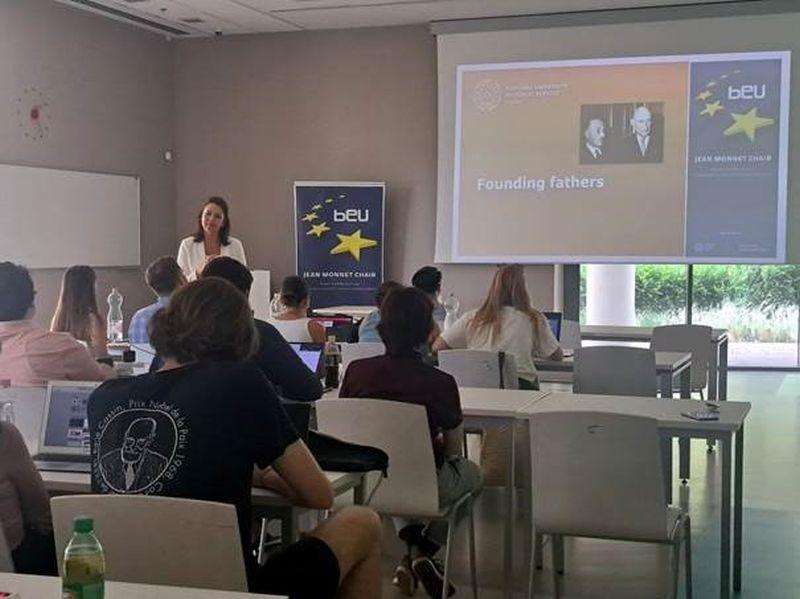
Boglárka Koller, the Jean Monnet Cahir of the University of Public Service gave a lecture on the history of the European unification process and the challenges facing the European Union today to a group of American, French and Central European students. In the context of the current challenges of the Union, it is worth recalling the beginnings of the integration process and the different periods of the unification.
The Ordered Liberty Summer University is a joint collaboration of the American University of Louisville and the University of Public Service. Every summer, law professors and political scientists from the United States and Hungary gather in Budapest to discuss the legal concept of “ordered liberty”. The Ordered Liberty Summer University in Budapest strives to help students correctly place the concepts of justice, law and freedom in their own country.
The concept of “ordered liberty” dates back to the work of Aristotle and Cicero, but the most complete formulation was given in his writings by 18th-century Irish statesman Edmund Burke. In the face of the radical decadence of the French Revolution, Burke made it clear that a good society is not created by utopian human constructions, but by three timeless virtues: the principles of justice, order, and freedom. We find challenges to this concept in many countries around the world, following the process by which political communities come to terms with new forms of technology and communication.
_____________________________________________________________________________________________________
17 May 2023, University of Public Service
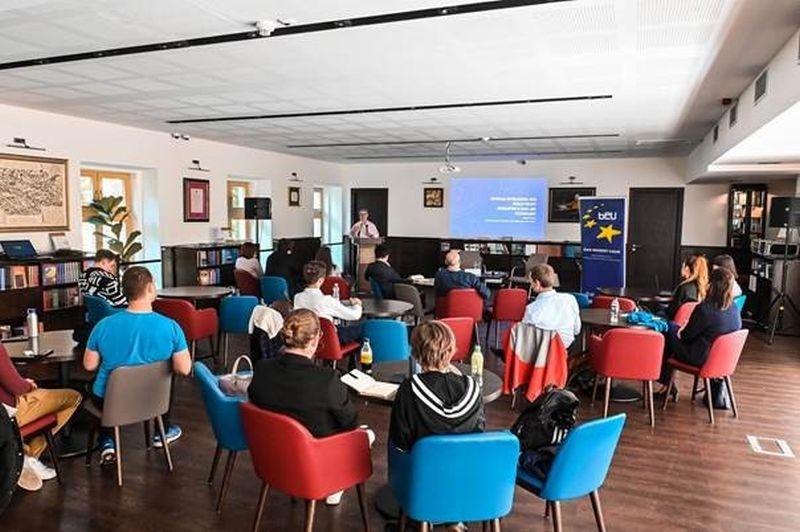
On 17 May 2023, Andrew Dolan, co-Director of the Center for the Study of the New Security Challenges (CSNSC) Ltd., held a workshop at Ludovika-University of Public Service titled Risk Identification and the Malicious Use of A.I. The event was opened by Dr Boglárka Koller, Jean Monnet Chair and vice-rector for international affairs, who also gave a brief introduction about Mr Dolan to the audience.
Mr Dolan started his speech with the sudden implosion of A.I., spreading to our daily life and now regularly affecting it. He highlighted the obvious benefits of this technology in areas such as healthcare and business; however, he was quick to underline the inadequacies of regulation and law regarding it: “Yet there is a growing concern that this technology has capabilities, which if used maliciously, can damage society and in extremis, become an existential risk.”
His main point was that regulation needs to be swift and thorough due to the unprecedented speed at the technology develops and parallel directly affects life. In addition, due to the nature of the technology, A.I. sometimes can seriously undermine the ability to tell fact from fiction – truth from untruth. Due to this property of the technology, exploitation is limitless, especially in the aspect of armaments and militaristic usage of A.I. “Last time something similar happened was directly after the Second World War when nuclear regulation became a hot topic”- said Mr Dolan. According to the expert, the possible catastrophes, which could happen due to the non-regulation of A.I., are not just fiction anymore. AI-enabled cyber weapons would seriously impact critical network infrastructure and the ‘Internet of Things’ – and a networked society is a seriously vulnerable society.
The presentation quickly turned into an interactive discussion with the audience actively joining in. During the discussion, the audience had the opportunity to speak directly with Mr Dolan and discuss the possible resolutions and different hot-takes on the issue of artificial intelligence.
_____________________________________________________________________________________________________
Europe Day 2023: When the future began.
Lessons from the history of the European Union
08 May 2023, UPS
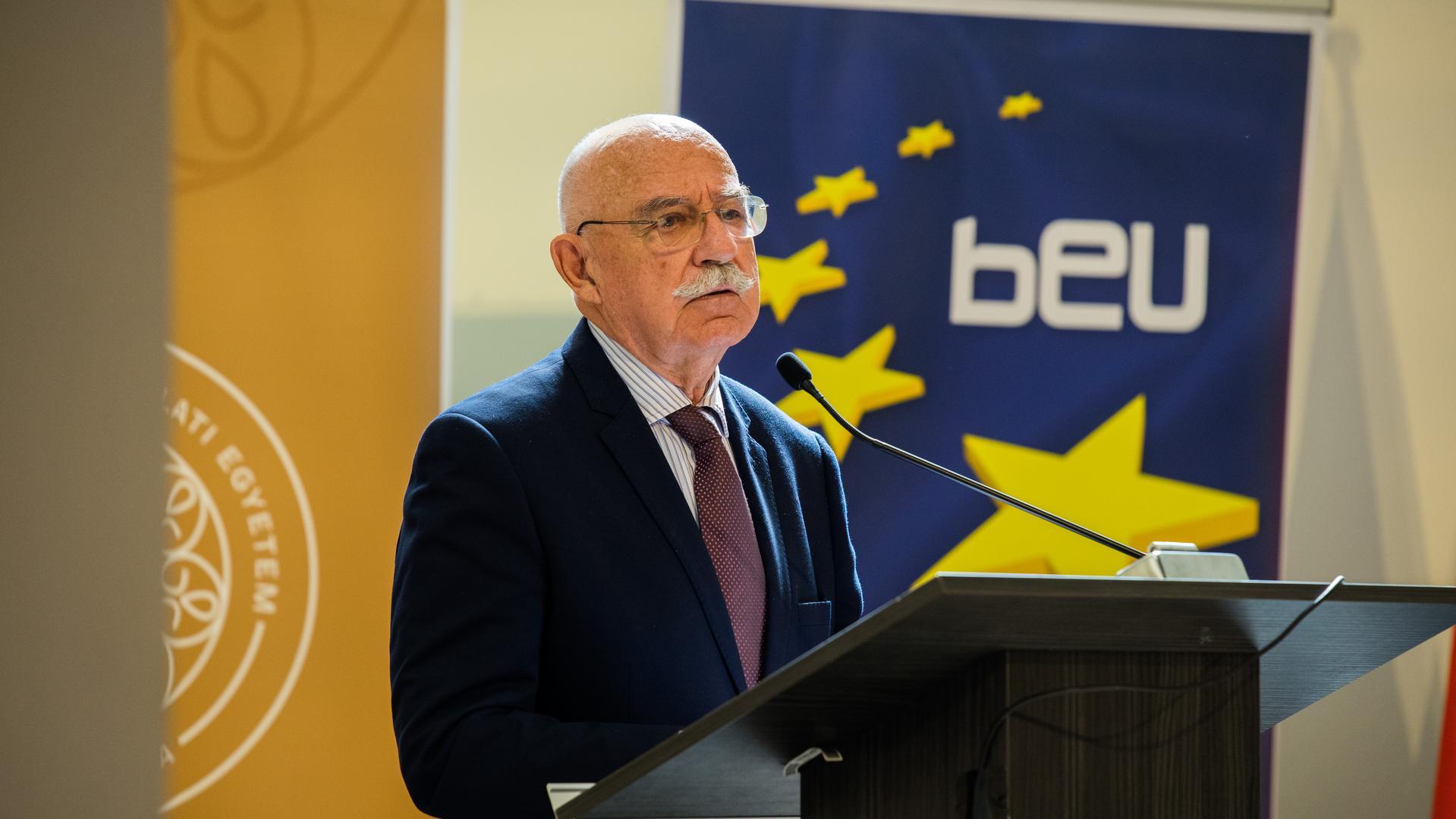
At the Europe Day Event, co-organised 8 May 2023 by the University of Public Service and the Otto Habsburg Foundation, experts gathered to discuss the lessons of the history of European integration.
The event brought together academics and politicians to review the history of integration and to share their thoughts on the future of the European Union.
"Every May, we Hungarians commemorate not only the foundations of the Union, but also Hungary's accession to the European Union," said Justice Minister Judit Varga, adding that next year - when Hungary will once again hold the rotating presidency of the Council of the European Union - we will celebrate the 20th anniversary of our membership. "The European Day of Peace and Unity is celebrated every year on 9 May, and this year the message of the event is of great significance," said rector Gergely Deli in his welcome speech.
János Martonyi, Hungary's former Foreign Minister, spoke about how the European integration process stated. Speaking of Jean Monnet, he said that it was because of him that integration had moved beyond the legal framework and that autonomous institutions had been created to which sovereign states had transferred decision-making powers.
The Treaty of Rome was signed on the Capitoline Hill, at the statue of the Pope, and the Treaty of Lisbon was signed in the monastery named after St Jerome, which means that Christianity is part of European identity, said Gergely Prőhle, head of the Institute for Strategic Studies of the university and director of the Otto Habsburg Foundation.
After the welcoming speeches, a round table discussion was held on the topic of European History - Hungarian Fate moderated by Boglárka Koller, Jean Monnet Chair and Vice-Rector for International Affairs at the National University of Budapest.
Recalling a visit to Australia in 2009, Tibor Navracsics, Minister for Spatial Development said: 'It was very strange to be confronted as a European with a map of Europe that did not have Europe at its centre, as we Europeans are used to. István Hiller, former Minister of Culture and Education and Member of Parliament, said that first felt free and European when he no longer had to turn around at the border and can directly travel to Austria without stopping. The third participant in the panel discussion, István Mustó, a former staff member of the German Development Institute and former Member of Parliament, spoke about the changes in world politics that have influenced integration: America has become a hegemonic power, the Soviet Union has disappeared and China has emerged. In the second part of the conference, moderated by Gergely Prőhle, Helmut Wohnout, Director General of the Austrian State Archives, spoke about the Austrian vision of the EU between 1945 and 1995, followed by a presentation on the European Union Historical Archives by Dieter Schlenker, Director of the Historical Archives of the European Union (European Union Institute, Florence), and a final presentation on History, Memory and the European Project by Aline Sierp, lecturer at Maastricht University.
https://www.uni-nke.hu/hirek/2023/05/09/az-integracio-multja-es-jovoje-europa-nap-az-nke-n
_____________________________________________________________________________________________________
bEU Project at the Largest Music Festival of Central Europe Jean Monnet Project of UPS at Sziget Festival 2022
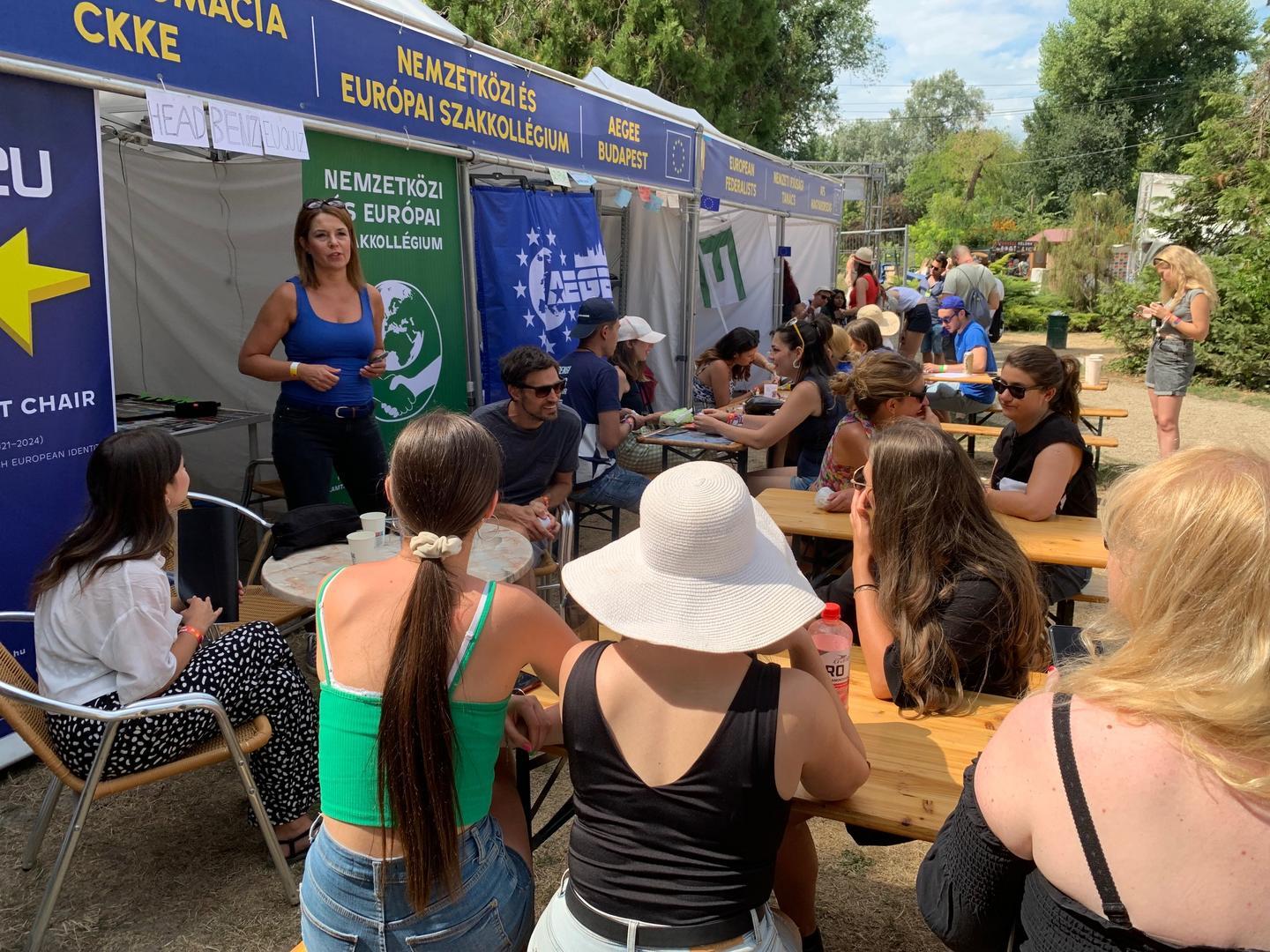
The Jean Monnet Chair of the bEU project, Boglárka Koller, PhD (Head of Department of European Studies, Vice Rector for International Affairs of UPS) had the opportunity to participate at an exciting roundtable discussion at the SZIGET Festival - one of Europe's largest music and cultural events in Europe - with Mátyás Maksi, acting head of the Representation of the European Commission in Budapest.
The audience’s main questions were centered around the current crisis areas of the EU, including the Russian-Ukrainian war and its multiple effects on the member states of the Union, the EU sanctions, the energy policy issues, the institutional challenges and the citizens' attitudes and trust in the EU.
Peter Rada, associate professor at the University of Public Service and promoter of the bEU project and the enthusiastic students of the International and European Advanced Studies College of UPS (NESZK) participated at the debate as well.
We were located at the NGO Island of the Sziget Festival, at the European Meeting point.
Media coverage:
https://www.facebook.com/photo?fbid=5496802500386097&set=pcb.5496812740385073&locale=hi_IN
UPS website:
https://en.uni-nke.hu/hirek/2022/08/17/the-jean-monnet-project-of-ups-at-sziget-festival-2022
_____________________________________________________________________________________________________
Europe Day Event + Photo Competition, 2022
Culture, faith, identity - hope for Europe
09 May 2022
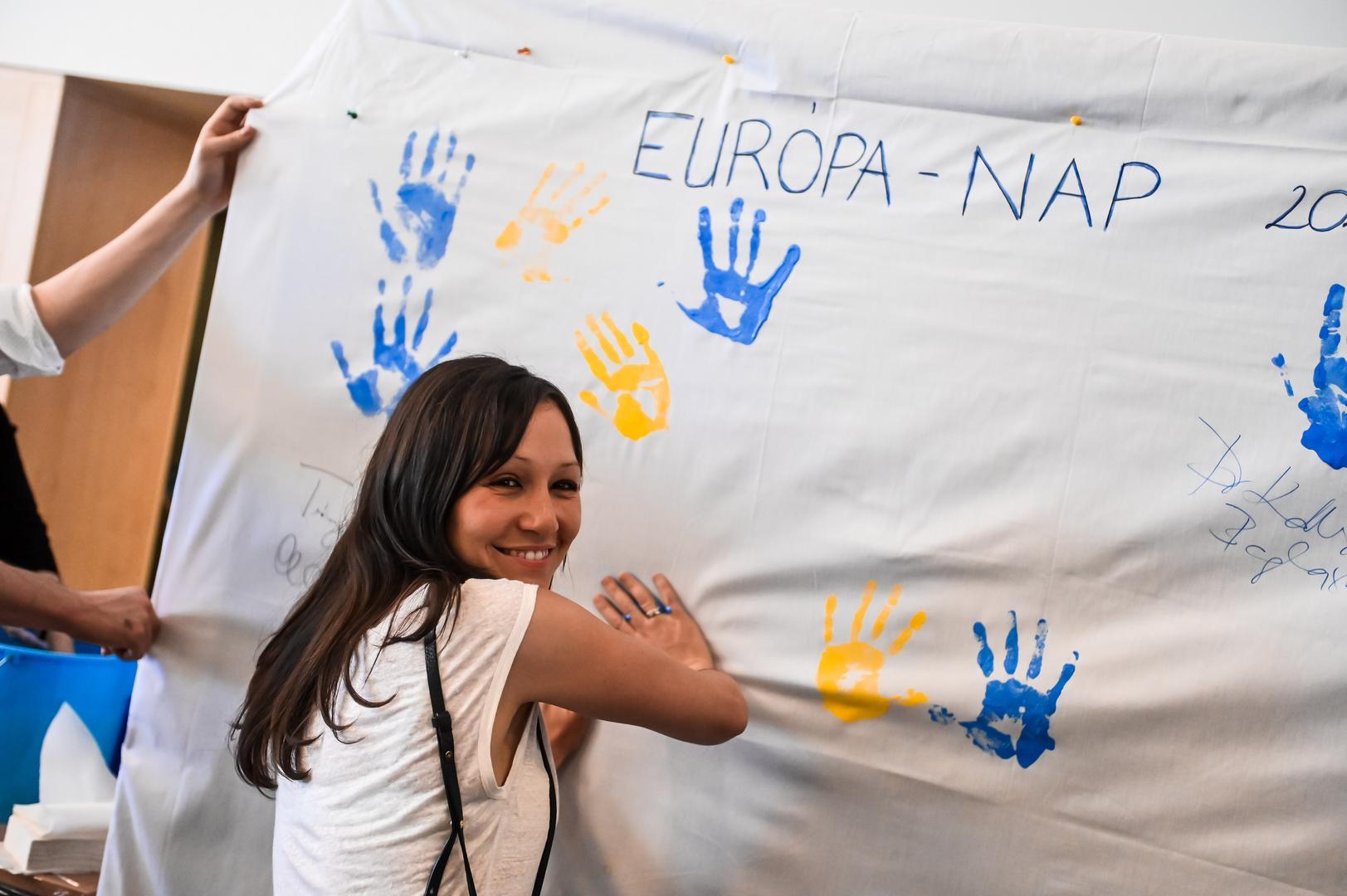
Europe exists in a changing global economic and political environment; the celebration is bittersweet because of war. Still, the crisis holds the potential for a continental rebirth - which was expressed at the Europe Day Conference in the Széchenyi Assembly Hall on the 72nd anniversary of the declaration of the Schuman Plan, which laid the foundations of the European Union. Hungary joined the Union 18 years ago. The conference speakers presented the journey Hungary has taken since 2004, the challenges of today, and the EU's future.
As a member of the Western alliance of values and interests, Hungary's task is to play an active role in shaping the future of the European Union, and the anniversary is an opportunity to take stock and plan for the future. "Just like Hungary, our university is openly embracing its European identity, representing the traditional values of European culture and believing in the importance of preserving them", Rector Gergely Deli opened the conference. According to the Rector of the University of Public Service, what makes us European is our history, respect for fundamental human rights, gender equality, and freedom of expression. According to the Rector, integration was the guarantee of peace and has evolved into cooperation, but now, with war raging in our neighbourhood, this must be followed by action.
The desire for peace has returned to Europe as a fundamental need," said Boglárka Koller, Vice-Rector for International Affairs. In her view, the current conflict shows that Europe is unable to extend its values beyond its borders, which is due to the lack of a standard foreign policy. The conflict has also broken the cohesion between Visegrád cooperation.
We will not forget 24 February 2022, and "looking back, we will know that Europe and the European Union have reached a real epochal threshold", said Boglárka Koller. She added that in these times, culture, faith, and identity give hope to the continent and that the crisis holds the potential for rebirth, so despite the circumstances, there is reason to celebrate Europe.
"Europe is declining, but it always survives", said János Martonyi, referring to the most successful process in the continent's millennial history, the extraordinary story of European integration. "There is no more time to wait; Europe must create its own security and defence dimension, with all its elements", said János Martonyi, who argued for the concept of strategic autonomy for the standard foreign, security and defence policy. All this must be built not against NATO but within the framework of North Atlantic cooperation. In addition, the creation of the single market must be completed, efforts to undermine it must be rejected, and ideological aspects that spill over into daily politics must be taken off the agenda.
A panel discussion on the European Union's role in the changing geopolitical space was also held at the conference. According to Boglárka Koller, although a state can adequately respond to the war conflict, the current "external shock" has brought member states together, and unified responses have been developed. Still, there is no complete unity today in the absence of a standard foreign and security policy. According to László Trócsányi, former Minister of Justice and Rector of the Károli Gáspár University of the Reformed Church, there is no way to win for neither the fighting parties nor Europe. Gergely Prőhle, director of the Institute of Strategic Studies, spoke of unity against external threats and the strong emergence of national interests and called the different perceptions of "victim and perpetrator" in the internal communication of some member states striking.
On Europe Day, the Jean Monnet Chair photo competition winners were awarded. "What does Europe mean to you?" was the competition's title, which was advertised by the Department of European Studies of the Faculty of Public Governance and International Studies in cooperation with the International and European College for Advanced Studies. The competition was open to students and academic staff alike. It was open to entries from individual and subjective perspectives on the history of Europe, its cultural and national traditions, the process of European unity, European integration and the challenges facing Europe today. According to the jury's decision, the works of Ekaterina Popova, PhD student, Fanni Kiss, a university student and Zoltán Pálfalvi, editor and presenter of Ludovika TV, were the best, and all three received Ludovika gifts. The event ended with a flash mob, where participants made hand-painted EU flags.
https://en.uni-nke.hu/hirek/2022/05/10/culture-faith-identity-hope-for-europe
_____________________________________________________________________________________________________
Guest Lecture of Dr. Krisztián Kecsmár at the University of Public Service
22 March 2023, University of Public Service
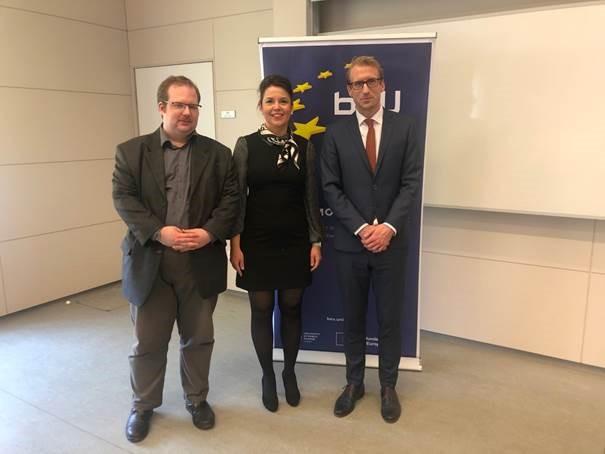
Dr. Krisztián Kecsmár, Judge of the General Court, Court of Justice of the European Union was invited by the Jean Monnet Chair, Dr. Boglárka Koller to give a lecture on how the European Court of Justice operates. In addition to his comprehensive presentation, Mr. Kecsmár also presented his career as a judge to the students. For students interested in European law, and planning a career in Europe, it was very relevant to hear about both the personal and practical aspects of his work.